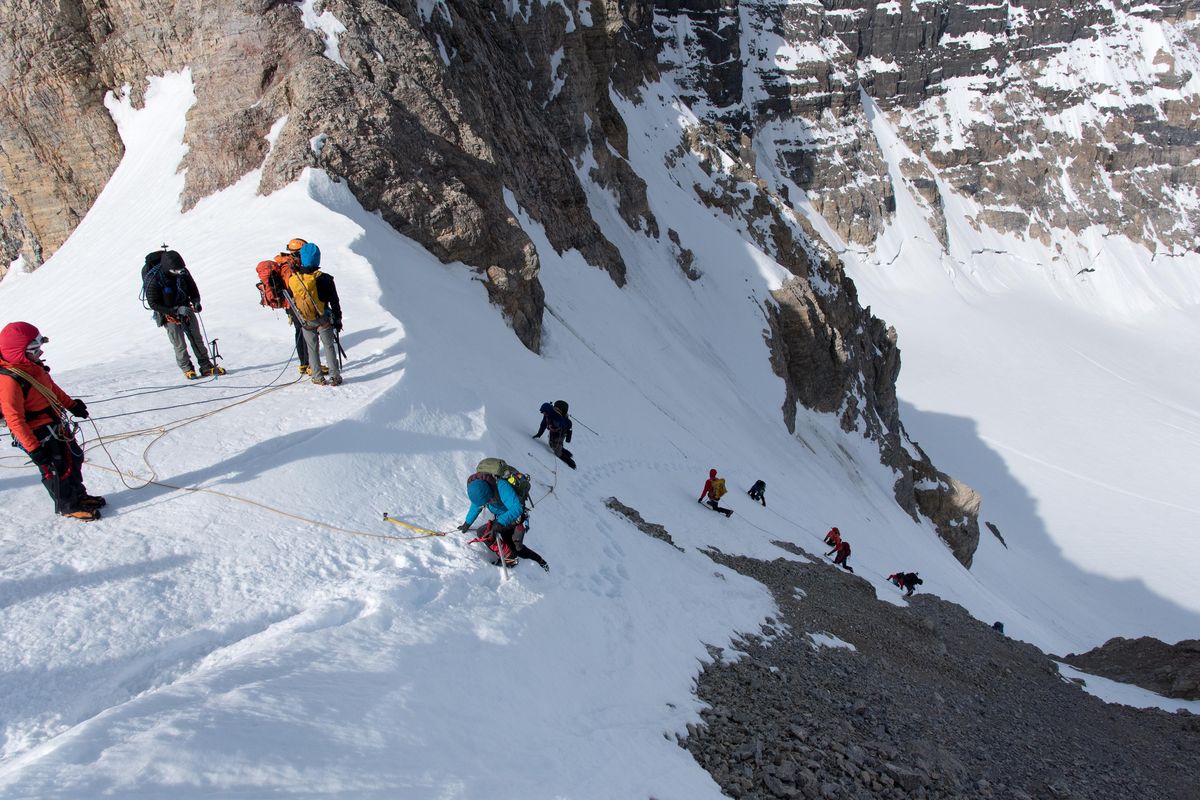The Spokane Mountaineers help launch climbing careers with annual Mountain School course

Snaking upward into the dark, a line of headlamps twinkles in the cold darkness of an early alpine morning. Each light a climber. Each climber a collection of hopes, desires and fears.
It’s just after 3 a.m. on May 27. The 30 or so climbers are members of the Spokane Mountaineers, and they’re toiling up 11,453-foot Mount Athabasca in Alberta as part of their graduation climb for the 2018 Mountain School.
For some, like Samantha Foxworth, the climb and the course were taken in the hopes of becoming more self-sufficient in the outdoors. Foxworth had climbed mountains before. But in the past, she’d simply follow her husband up.
She wanted to lean more.
Or there was Eric Williams. Williams took a basic mountaineering course when he was 18 years old. That was two decades ago. He loved it. But life happened and “20 years go by in a flash and I haven’t done any climbing.”
He wanted to get back to climbing.
Regardless of the motivation, these climbers found themselves roped together and trekking through the early-morning darkness. The climb was the culmination of 13 weeks of classroom sessions and weekend excursions.
Perhaps more impressive than the climb itself is the tricky work of bringing 43 people together and teaching them skills that could save or end their lives.
That’s the work the Spokane Mountaineers, an all-volunteer organization, has been doing for decades. It’s hard work with potentially serious consequences.
“You have to tie a clove hitch right. It’s life or death,” said AnneMarie Bergeleen, one of two directors of this year’s Mountain School.
Demand for that kind of instruction is only increasing. With more people heading into the outdoors, Spokane Mountaineer courses have become more popular. For an all-volunteer organization, that growth is a double-edged sword. With increased interest comes increased membership, dues and volunteers. But it also means a greater need for high-quality and reliable instruction.
“There is a wait list,” said Matt Jeffries, president of Spokane Mountaineers. “We’re turning people away from every single class.”
The Spokane Mountaineers didn’t start in the mountains. In fact, it was born in the lowlands. In 1915 five woman who all worked at the Spokane Public Library started the Spokane Walking Club. For one year the club did not allow men. But in 1916 a “controversial” vote allowed men to join.
It remained the Spokane Walking Club until 1921, at which time it was renamed the Spokane Mountaineers Club. Still, it’s mostly focused on hiking.
In 1937 that started to change with the addition of Climbing Class, a predecessor to Mountain School.
Since then, the club has taken countless groups of students into the high wild, teaching them the basics of mountaineering. The club also offers hiking, biking and paddling.
But Mountain School remains the keystone course offered by the mountaineers. Instructors say the course is designed to get people outside and into the mountains.
“In my opinion, mountain school is really a springboard,” Jeffries said. “It’s a launching point.”
Jeffries took mountain school in 2011. Since then, he’s gone on to climb more difficult and demanding routes.
John Bergeleen, the other director for 2018 Mountain School, echoed Jeffries. Bergeleen also took mountain school and used it as a launching point for more ambitious climbing.
“It’s very much a foundational class,” he said.
For Allison Roskelley, who took the course in 2016, Mountain School was, at first, all about fitting in. In 2015, she’d married Jess Roskelley, a world-class climber and the progeny of one of America’s greatest alpinists, John Roskelley.
But Roskelley said her motivation shifted while going through the course.
“Coming into that family, I figured I really needed a base or a background so I could speak to his world,” she said. “And then I really fell in love with this world (of climbing) myself.”
Over the course of 13 weeks students learn the basics – what kind of food to pack and how to walk downhill, to more complex skills such as crevasse rescue, self-arrest and glacial navigation.
The skills are introduced in the classroom and honed during several weekend outings. Snow camping on Mount Spokane is many students’ first exposure to winter camping. A weekend at Stevens Peak introduces early-morning starts and roped team travel to the participants’ toolbox.
The course is not designed to weed people out. But the demands of the classwork (most Wednesday nights for two hours) and the weekend outings lead to some attrition each year.
Forty-three people started the class in 2018, AnneMarie Bergeleen said. Over the course of the 13-week-long class, a handful dropped out. In the end, 29 students summited Athabasca in May, with several turning back because of sickness or fatigue.
For many, it was their first time on glaciers or at altitude.
Foxworth, who took the 2018 course, said she left feeling more confident and competent outside. She imagines someday taking her two young daughters into the mountains using the skills she learned in Mountain School.
But even more than the technical skills, she said she learned to be more outgoing and comfortable meeting and climbing with new people.
“In the outdoor community, everyone is outgoing and charismatic,” she said. “That really pulled me out of my shell and that carried over after the class. I feel a lot more socially confident.”